Kenneth L. Gentry Jr.'s Blog, page 11
October 4, 2024
DOES GOD OPPOSE ALCOHOL? (5)
 PMW 2024-078 by Kenneth L. Gentry, Jr.
PMW 2024-078 by Kenneth L. Gentry, Jr.
This is my final installment in a series analyzing the leading Scriptures that are deemed to prohibit alcohol consumption. I will start with:
Isaiah 5:21–22
Woe to those who are wise in their own eyes,
And clever in their own sight!
Woe to those who are heroes in drinking wine,
And valiant men in mixing strong drink.
This passage calls down woes upon “heroes in drinking wine.” And rightly so. But clearly this does not universally condemn all wine drinking. This should be evident for a number of reasons:
First, as we have seen, abundant evidence from Scripture shows that wine may be consumed in a righteous manner and by righteous men — including even the Son of God. And Scripture does not contradict Scripture.
Second, we find these verses set in a larger judgment context, where the prophet condemns other normally acceptable practices. For instance, verse 8 calls down woe upon those who “join house to house.” Is multiplying real estate holdings always sinful? In verse 12 we learn that the Jews are attending banquets where music is produced “by lyre and harp, tambourine and flute.” Are public festivities involving music necessarily evil?
Third, the immediate context already suggests the moderationist’s interpretation:
“Woe to those who rise early in the morning that they may pursue strong drink;
Who stay up late in the evening that wine may inflame them!” (Isa. 5:11)
Note that these “rise early” to “pursue strong drink”; they “stay up late in the evening” so that “wine may inflame them.” These men are not moderate drinkers! In fact, Isaiah condemns them because they “drag iniquity with the cords of falsehood” (v. 18) and “call evil good and good evil” (v. 19). These men are “wise in their own eyes” (v. 20) and “justify the wicked for a bribe” (v. 23). Immediately before the condemnation of those who justify the wicked by accepting bribes (v. 23) we read our verse about “heroes in drinking wine” (vv. 21-22). What could be more clear?
Consequently, verses 21 and 22 refer to an immoderate abuse of wine by judges (v. 23). J. A. Alexander notes that “the tone of this verse is sarcastic, from its using terms which express not only strength but courage and heroic spirit, in application to exploits of drunkenness.”
Jeremiah 35:6
But they said, “We will not drink wine, for Jonadab, the son of Rechab, our father, commanded us, saying, ‘You shall not drink wine, you or your sons, forever.’”
From time to time those who forbid wine drinking will point to this episode in Scripture as a noble example of a fitting testimony to abstinence. Once again, though, this does not stand as a universal, divine obligation to abstinence.
Reformed Eschatology in the Writings of Geerhardus Vos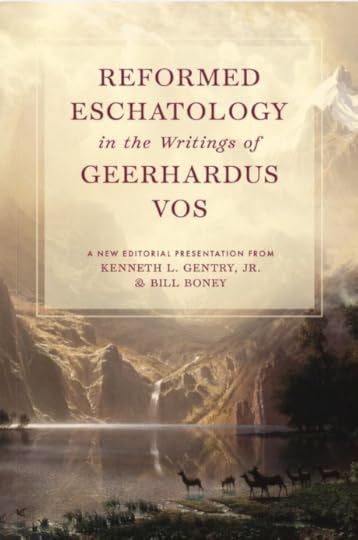
Ed. by Ken Gentry and Bill Boney
This is a collection of several key eschatological studies by the renowned Reformed theologian Geehardus Vos. We have modernized Vos’ grammar and syntax and updated his layout style according to modern publishing conventions (shorter sentences and paragraphs). We did this without changing any of Vos’ arguments.
For information on the upcoming Geerhardus Vos work or to pre-order it, see:
https://axeheadpress.com/pages/coming-soon-vos
First, note that this is a human command which Jonadab gives to his sons (vv. 5, 6, 8). This testimonial carries with it no “thus saith the Lord.” Rather it is a family practice that passes down by human authority through the line of this singular family. We must not universalize noble testimonies of individual families, otherwise we would all dedicate our children to temple service (as did Samuel’s mother, 1 Sam. 1:11, 20-22) and commit our children to Naziritic holiness (as did Samson’s mother, Jdgs. 13:5).
Second, it also forbids the owning of a house (vv. 7, 9). Obviously, owning a home is not sinful. In fact, the Lord Jesus Christ himself promises blessings of houses to his faithful followers: “Jesus said, ‘Truly I say to you, there is no one who has left house or brothers or sisters or mother or father or children or farms, for My sake and for the gospel’s sake, but that he shall receive a hundred times as much now in the present age, houses and brothers and sisters and mothers and children and farms, along with persecutions; and in the age to come, eternal life’” (Mark 10:29-30).
Third, the context of this command implies that this was a form of prophetic theater. That is, this obligation serves as a prophecy acted out against sinful conditions. For instance, Hosea lives out prophetic theater when God commands him to marry a harlot (Hos. 1:2; 3:1) as a symbolic portrayal of God’s love for unfaithful, idolatrous Israel (Hos. 1:2, 4-11). Here in Jeremiah 35 the sons of Jonadab portray a spiritual truth by keeping this vow. By obeying this obviously unnecessary and unreasonable command of their father, they serve as a testimony against faithless Israel for her refusal to obey God’s good and reasonable law (Jer. 35:12-19).
Hosea 7:5
On the day of our king, the princes became sick with the heat of wine;
He stretched out his hand with scoffers.
Reynolds uses this passage to forcefully illustrate the dangerous nature of alcoholic wine. In fact, his chapter title is: “Hosea 7:5 and the Question of the Poisonous Nature of Wine When It Is Alcoholic.” He attempts an interesting lexical argument to prove that the word translated “heat” (NASB, NAB, NRSV) should better be translated “poison”:
The question still remains whether chamath is properly to be translated heat, anger, or poison. Chemah from which it is derived may have any one of these meanings, the context being used to determine which meaning is correct in any particular case.
Here the reader must choose between — the heat of wine make sick, the anger or wrath of wine makes sick, or the poison of wine makes sick. Poison regularly makes the one who takes it sick. Heat and anger may sometimes make the person who is affected by them sick, but not regularly. Therefore poison is to be preferred.
We must notice that the Bible does not say that this poison is something other than alcohol which malicious people have added to the king’s wine. It is the poison of wine, that is the poison of alcohol, the poison in grape juice which has fermented.
We already have a reference in Proverbs 23:32 to alcoholic wine’s being like the bite of a poisonous snake. When adequately translated, Hosea 7:5 is a second reference to the poison of (alcoholic) wine.
In response, note that though Reynolds prefers the translation “poison,” no modern translation committee does. And for good reason: The context all around it crackles with flames. Consider the surrounding context and note how nicely “heat” fits in 7:5 (emphases mine):
They are all adulterers
Like an oven heated by the baker,
Who ceases to stir up the fire
From the kneading of the dough until it is leavened.
On the day of our king, the princes became sick with the heat of wine;
He stretched out his hand with scoffers,
For their hearts are like an oven
As they approach their plotting;
Their anger smolders all night,
In the morning it burns like a flaming fire.
All of them are hot like an oven,
And they consume their rulers;
All their kings have fallen.
None of them calls on Me. (Hos. 7:4-7)
Furthermore, the imagery Hosea presents is of kings who are drunk on wine. They are “sick with . . . wine,” which is a familiar problem with those who drink too much of it (Isa. 19:14; 28:8; Jer. 25:27; 48:26). This abuse of wine by men in positions of authority is a common problem that the prophets confront (and which explains Prov. 31:4-5), as we may discern from a several references (Isa. 5:22-23; 19:14; 28:7; 56:12).
That’s all folks! Thanks for reading.
[image error]For more information and to order click here.
" data-image-caption="" data-medium-file="https://postmillennialworldview.com/w..." data-large-file="https://postmillennialworldview.com/w..." tabindex="0" role="button" class="alignright size-full wp-image-495" src="https://postmillennialworldview.com/w..." alt="" />God Gave Wine (by Ken Gentry)
A biblical defense of moderate alcohol consumption. Considers all key biblical passages and engages the leading objections.
See more study materials at: www.KennethGentry.com
October 1, 2024
DOES GOD OPPOSE ALCOHOL? (4)
 PMW 2024-077 by Kenneth L. Gentry, Jr.
PMW 2024-077 by Kenneth L. Gentry, Jr.
This is my fourth installment in a series considering passages in Scripture that seemingly prohibit any consumption of alcohol. We are discovering that these verses have to be ready uncarefully and uncontextually. Let us continue.
Proverbs 23:31-32
Do not look upon the wine when it is red,
When it sparkles in the cup,
When it goes down smoothly-,
At the last it bites like a serpent,
And stings like a viper.
Undoubtedly this passage is one of the most frequently employed texts in the debate over wine drinking. Indeed, prohibitionist Reynolds in his Alcohol and the Bible not only opens his major argument (p. 9) with this passage, but closes his book by referring to it (p. 64). He cites this passage over twenty times in his follow up work, Biblical Approach to Alcohol. We may fairly state that, according to Reynolds and those of like persuasion, this passage is the most significant and compelling prohibitionist statement in Scripture. Reynolds comments: “It is the intent of this essay to prove that Proverbs teaches an absolute prohibition against the beverage use of alcohol.” Before interpreting the passage, then, it will be helpful to cite some of Reynolds’s observations on it.
Reynolds’ Argument
In a section entitled “The Absolute Prohibition of Proverbs 23:29-31” we discover the following comments:
“It is true that hyperboles occur in the Bible, but one cannot read Proverbs 23:29-35 without coming to the conclusion that God is speaking of something He loathes as an article for human consumption. There is no suggestion that a good thing which He has given to us to enjoy is in view here. It is viper’s poison (verse 32) and the command is not to look on it.”
The Divorce of Israel: A Redemptive-Historical Interpretation of Revelation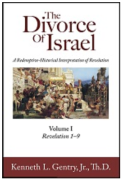
This long-awaited commentary has now been published. It is an 1800 page, two-volume deeply exegetical, academic commentary on the Bible’s most mysterious book.
Click: https://www.kennethgentry.com/the-divorce-of-israel-2-vols-by-gentry-pre-publication-offer/
See more study materials at: www.KennethGentry.com
Reynolds then argues from what he deems a parallel situation. He observes that when Lot leaves Sodom, God forbids his looking back upon the city (Gen. 19:17ff). This is due to the moral evil that infests Sodom. Hence the absolute prohibition by God. Thus, God “also put an absolute prohibition on looking at a certain sort of yayin (Prov. 23:31). . . . The prohibition is absolute, like that of looking at Sodom.”
In Reynolds’s view the absolute prohibition is here in Proverbs 23 and not at other references to yayin because the wine is specifically designated as “red.” As I have noted previously, the idea behind this “red” designation is that it is alcoholic, causing redness of eyes and nose when indulged in. Thus, he concludes: “It is puerile to suppose this command is not to be taken seriously and that the prohibition is not absolute. All the prohibitions of Proverbs 23 are absolute.”
My Response
Reynolds suggests some intriguing arguments based on lexical considerations supporting his view that “red” indicates “alcoholic.” And he may well be correct in this observation. We can concede his point, however, without at all altering the moderationist argument. Note the following observations on the substance of his arguments:
First, we must divorce this passage from its near, far, and ultimate contexts to bear the construction Reynolds places upon it. The near context is extremely clear: the warning and admonition specifically apply to immoderate abusers of wine:
29. Who has woe? Who has sorrow? Who has contentions? Who has complaining? Who has wounds without cause? Who has redness of eyes?
30. Those who linger long over wine, Those who go to taste mixed wine.
31. Do not look on the wine when it is red, When it sparkles in the cup, When it goes down smoothly;
32. At the last it bites like a serpent, And stings like a viper.
33. Your eyes will see strange things, And your mind will utter perverse things.
34. And you will be like one who ties down in the middle of the sea, Or like one who lies down on the top of a mast.
35. “They struck me, but I did not become ill; They beat me, but I did not know it. When shall I awake? I will seek another drink.”
God’s Law Made Eas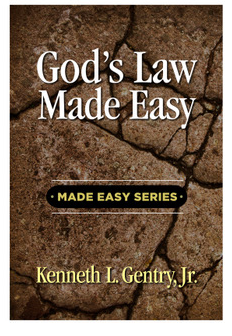 y
y
(by Kenneth Gentry)
Summary for the case for the continuing relevance of God’s Law. A helpful summary of the argument from Greg L. Bahnsen’s Theonomy in Christian Ethics.
See more study materials at: www.KennethGentry.com
How could a context be any clearer? Here Proverbs specifically and carefully describes the person whom it admonishes. This person exhibits all the emotional, social, and physical characteristics of the drunkard: depression (v. 29a), a contentious spirit (v. 29b), and telltale physical appearance. (v. 29c). Here we have before our view those who “linger long over wine” (v. 30). These drunkards have developed alcohol-induced delusions (v. 33), disorientation (v. 34), and detachment (v. 35a, b). But despite all this, such an addict to wine refuses to give it up (v. 35c).
In his later work, Reynolds considers “strange” my argument that this passage confronts the drunkard. He asserts that drunkards are not addressed “directly” because they “are not assumed to be teachable.” Rather, in this context the writer directs the command “thou,” not “this miserable addict.”
This is surely a most remarkable claim: Does the Scripture give up on those caught up in drunkenness? Are we not to minister to the alcoholic and confront him from Scripture? And why is it just the drunkard who is unteachable; why not those overwhelmed by other addictive sins (such as promiscuity or covetousness)? Does not Proverbs 24:15 directly confront the covetous robber:
Do not lie in wait, O wicked man, against the dwelling of the righteous;
Do not destroy his resting place.
Actually the Bible does deal directly with drunkards, warning them of their doom: In the rebellious son legislation, the parents obviously attempt rebuke and correction over a period of time (Deut. 21:20). Though it is not successful, nevertheless the attempt is made. In fact, Joel 1:5 expressly addresses the drunkard:
Awake, drunkards, and weep;
And wail, all you wine drinkers,
On account of the sweet wine
That is cut off from your mouth.
Furthermore, the broader context of Proverbs 23 is almost as helpful. Verses 20-21 prepare us for the warning of verse 31:
Do not be with heavy drinkers of wine,
Or with gluttonous eaters of meat;
For the heavy drinker and the glutton will come to poverty,
And drowsiness will clothe a man with rags.
In addition, Reynolds is surely wrong when he forthrightly declares: “the prohibition of Proverbs 23:31 is not properly explained in any other way than total.” But this no more universally and absolutely prohibits wine drinking than verse 4 of the same chapter universally and absolutely forbids wealth accumulation:
Do not weary yourself to gain wealth,
Cease from your consideration of it.
After all, the Lord grants his obedient people “the power to make wealth” (Deut. 8:18) and promises economic abundance for covenant faithfulness (Deut. 28:1:14; cf. Gen. 13:2; Job 1:1-3). We must understand Proverbs 23:4 contextually. He warns against a wholesale thirst, a driving ambition to gain wealth, which is much like the alcoholic who gives his life over to a wholesale thirst for booze.

Greatness of the Great Commission (by Ken Gentry)
An insightful analysis of the full implications of the great commission as given in Matthew 28:18-20. Impacts postmillennialism as well as the whole Christian worldview.
See more study materials at: www.KennethGentry.com
Finally, the ultimate context is the entire Scripture, which clearly does not forbid the moderate partaking of “aged wine” (Isa. 25:6), “strong drink” (Deut. 14:26), or “all sorts of wine” (Neh. 5:18). The “gladdening effect” of wine is acceptable, at least to some degree (Psa. 104:15; Eccl. 9:7; 10:19; 2 Sam. 13:28; Est. 1:10; Zech. 9:15; 10:7; Judg. 9:13).
Second, Reynolds distorts a figure involved in Proverbs 23:32. The text does not say, “It is a viper’s poison.” Rather, it warns: “at the last it bites like a serpent, and stings like an adder.” A world of difference separates reality (“is”) and analogy (“is like”). It is only “at the last,” after “lingering long” that wine becomes harmful “like” a viper. The abuse of wine is in view here, not the use.
In this respect it is somewhat similar to Isaiah 1:10-14, which reads:
Hear the word of the Lord,
You rulers of Sodom;
Give ear to the instruction of our God,
You people of Gomorrah.
“What are your multiplied sacrifices to Me?”
Says the Lord.
“I have had enough of burnt offerings of rams,
And the fat of fed cattle.
And I take no pleasure in the blood of bulls, lambs, or goats.
When you come to appear before Me,
Who requires of you this trampling of My courts?
Bring your worthless offerings no longer,
Incense is an abomination to Me.
New moon and sabbath, the calling of assemblies —
I cannot endure iniquity and the solemn assembly.
I hate your new moon festivals and your appointed feasts,
-They have become a burden to Me.
I am weary of bearing them.
Under the particular circumstances, the otherwise God-ordained sacrifices, offerings, incense, assemblies, and feasts are an unendurable burden to the Lord (vv. 13-14). Obviously the context must inform us why God hates these good things. And it does: the rulers of Israel are living like those of Sodom, the people like those of Gomorrah (v. 10). Their hands are “covered with blood” (v. 15). In short, at this time Israel is a sinful nation,
[A] people weighed down with iniquity,
Offspring of evildoers,
Sons who act corruptly! (v. 4).
God does not accept the worship of the hypocrite and the rebel.
Third, Reynolds’s particular illustration destroys his own argument. A careful reading of Genesis 19 indicates the limited nature of the prohibition to took upon Sodom and Gomorrah. God forbids Lot and his family to look back (v. 17) while God’s wrath is falling upon those cities. Lot’s wife looks back at that moment, and she dies (v. 26). But Abraham looks down upon the cities shortly after the judgment and lives (vv. 27-28). Likewise is it with the long-lingering alcoholic (Prov. 23:30), one who refuses moderation (v. 35) — wisdom forbids his looking upon wine.
Reformed Eschatology in the Writings of Geerhardus Vos
Ed. by Ken Gentry and Bill Boney
This is a collection of several key eschatological studies by the renowned Reformed theologian Geehardus Vos. We have modernized Vos’ grammar and syntax and updated his layout style according to modern publishing conventions (shorter sentences and paragraphs). We did this without changing any of Vos’ arguments.
For information on the upcoming Geerhardus Vos work or to pre-order it, see:
https://axeheadpress.com/pages/coming-soon-vos
Fourth, although Reynolds may be correct in asserting that the reference to “red” in Proverbs 23:31 indicates the wine’s alcoholic content, it is simply not true that “there was no other word in the ancient languages in which the Bible was written for alcoholic beverages.” Reynolds admits differing with the consensus of Bible translations over this point. Earlier in this book I point out that lexicographers affirm what Reynolds denies: oinos, shekar, and other terms do in fact refer to alcoholic wine. And if Reynolds is correct when he asserts that the phrase in Proverbs 23:31 is the only phrase that refers to alcohol, then this one verse becomes the only verse in all of Scripture that warns of alcohol abuse!
[image error]For more information and to order click here.
" data-image-caption="" data-medium-file="https://postmillennialworldview.com/w..." data-large-file="https://postmillennialworldview.com/w..." tabindex="0" role="button" class="alignright wp-image-495" src="https://postmillennialworldview.com/w..." alt="" width="112" height="174" />God Gave Wine (by Ken Gentry)
A biblical defense of moderate alcohol consumption. Considers all key biblical passages and engages the leading objections.
See more study materials at: www.KennethGentry.com
September 27, 2024
DOES GOD OPPOSE ALCOHOL? (3)
 PMW 2024-076 by Kenneth L. Gentry, Jr.
PMW 2024-076 by Kenneth L. Gentry, Jr.
In this survey of alleged negative passages regarding alcohol consumption, we come to perhaps the most used passage in this regard, Proverbs 20:1.
Proverbs 20:1
Wine is a mocker, strong drink a brawler.
And whoever is intoxicated by it is not wise.
Charismatic Gift of Prophecy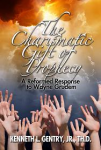
(by Kenneth Gentry)
A rebuttal to charismatic arguments for the gift of prophecy continuing in the church today. Demonstrates that all revelatory gifts have ceased as of the conclusion of the Apostolic era.
See more study materials at: www.KennethGentry.com
Although not tied to unique circumstance, this verse does not universally prohibit wine drinking. The statement refers to the inebriating potential of wine and strong drink, of which the user must be wary. It warns those who use it immoderately. Note the following observations:
First, the general warning pattern. The warning “wine is a mocker” follows the pattern of 1 Corinthians 8:1, which says that “knowledge makes arrogant.” Obviously neither Christian ethics nor a biblical world-view disparage the quest for knowledge as a proper function of rational beings generally, or of Christians specifically. In certain respects wine-consumption and knowledge-acquisition are similar, and bring certain responsibilities with them. That is, each can be used for either good or evil. The point of Proverbs is that wine has the potential to mock, just as the point of Paul is that knowledge has the potential to make arrogant. Not all who have knowledge are “arrogant.” Neither do all who partake of wine become “mockers” or “brawlers.”
Second, the particular warning specifics. This warning speaks to the abuse of wine, and not just by analogy. Delitzsch’s comments on this passage are very much to the point:
“Wine is a mocker, because he who is intoxicated with it readily scoffs at that which is holy; mead is boisterous . . . because he who is inebriated in his dissolute madness breaks through the limits of morality and propriety. He is unwise who, through wine and the like, i.e. overpowered by it (cf. 2 Sam. 13:28), staggers, i.e. he gives himself up to wine to such a degree that he is no longer master of himself.”
He adds that the writer is referring to “the passionate slavish desire of wine or for wine.” This is why he follows the statement “wine is a mocker, strong drink a brawler” by the comment “he who is intoxicated by it is not wise.” Thus, the context itself clearly indicates that the abuse of wine, the inordinate consumption of strong drink is the concern.
Third, the wider warning context. The biblical interpreter must not be selective in his approach to Scripture. We must not divorce particular verses from their wider contexts, nor extract them from the whole system of biblical ethics. I have paraded a mass of evidence before the concerned reader — evidence overwhelmingly supporting the moderationist position. Remember that elsewhere in Scripture we learn that God himself gives us “wine which makes man’s heart glad” (Psa. 104:15). Wine is a joyful reward to those obedient to God (Deut. 14:26ff.). Wine, which in the drunkard’s life is a “brawler,” is in the poetry of God an emblem of messianic blessing (e.g., Amos 9:13-15). Proverbs 20:1 cannot and must not contradict these positive passages elsewhere.
Proverbs 21:17
He who loves pleasure will become a poor man;
He who loves wine and oil will not become rich.
Prohibitionists widely employ this statement in warning against the end results of wine drinking. Oftentimes opponents of alcoholic beverages point to sociological studies and cultural statistics regarding alcoholism, noting that Proverbs 21:17 warns us of such an outcome. Van Impe’s Alcohol: The Beloved Enemy and Wilkerson’s Sipping Saints both weigh in heavily with anecdotal and sociological evidence in this direction. And such ethical breaches and social problems are a concern to moderationists, as well.
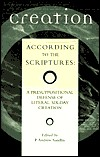 Creation according to the Scriptures
Creation according to the Scriptures
Ed. by P. Andrew Sandlin
This book is sub-titled: A Presuppositional Defense of Literal , Six-day Creation. It has chapters by R. J. Rushdoony, Andrew Sandlin, Kenneth Gentry, Cornelius Van Til, and others. It touches on historical, exegetical, theological, and philosophical implications of Six-day Creation.
See more study materials at: www.KennethGentry.com
But once again, we wrongly apply this verse when promoting total abstinence or prohibition. The verse refers to a constant, inordinate thirst for wine to the neglect of labor and other godly virtues. Notice that the writer does not mention the love of wine alone. He also warns about the love of oil, which is used with perfumes for refreshment from the hot, dry mid-eastern sun. Is oil then, an element the righteous must avoid? Obviously not, for God gives man oil (Ps. 104:15). In fact, Proverbs also mentions oil in a good context:
Oil and perfume make the heart glad,
So a man’s counsel is sweet to his friend. (Prov. 27:9)
Rather, Proverbs 21:17 warns men to keep things in perspective. If the love of money is a root of evil (1 Tim. 6:10), are we then to abstain from all money? Or is it the love of money that is the issue there?
Reformed Eschatology in the Writings of Geerhardus Vos
Ed. by Ken Gentry and Bill Boney
This is a collection of several key eschatological studies by the renowned Reformed theologian Geehardus Vos. We have modernized Vos’ grammar and syntax and updated his layout style according to modern publishing conventions (shorter sentences and paragraphs). We did this without changing any of Vos’ arguments.
For information on the upcoming Geerhardus Vos work or to pre-order it, see:
https://axeheadpress.com/pages/coming-soon-vos
Actually in its poetic setting, the warning here in Proverbs 21:17 is directed against the party life mentality:
He who loves pleasure will become a poor man;
He who loves wine and oil will not become rich.
Note the parallelism: the one who “loves wine and oil” is the one who “loves pleasure.” That is, he is the one who lives a life solely for the pursuit of pleasure, even to the point of riotous abandon. Elsewhere Proverbs describe this type of person is similarly:
For the heavy drinker and the glutton will come to poverty,
And drowsiness will clothe a man with rags. (Prov. 23:21)
The lifestyle of this person will come to poverty. Isaiah refers to such party animals in Isaiah 5:11:
Woe to those who rise early in the morning that they may pursue strong drink;
Who stay up late in the evening that wine may inflame them!
[image error]For more information and to order click here.
" data-image-caption="" data-medium-file="https://postmillennialworldview.com/w..." data-large-file="https://postmillennialworldview.com/w..." tabindex="0" role="button" class="alignright size-full wp-image-495" src="https://postmillennialworldview.com/w..." alt="" />God Gave Wine (by Ken Gentry)
A biblical defense of moderate alcohol consumption. Considers all key biblical passages and engages the leading objections.
See more study materials at: www.KennethGentry.com
September 24, 2024
DOES GOD OPPOSE ALCOHOL? (2)
 PMW 2024-075 by Kenneth L. Gentry, Jr.
PMW 2024-075 by Kenneth L. Gentry, Jr.
This is my second in a five-part series on the Christian and alcoholic beverages. I am highlighting the passages that many evangelicals believe condemn any and all use of wine or alcoholic beverages.
Numbers 6:2–6
This famous passage reads:
“Speak to the sons of Israel, and say to them, “When a man or woman makes a special vow, the vow of a Nazirite, to dedicate himself to the LORD, he shall abstain from wine and strong drink; he shall drink no vinegar, whether made from wine or strong drink, neither shall he drink any grape juice, nor eat fresh or dried grapes. All the days of his separation he shall not eat anything that is produced by the grape vine, from the seeds even to the skin. All the days of his vow of separation no razor shall pass over his head. He shall be holy until the days are fulfilled for which he separated himself to the LORD; he shall let the locks of hair on his head grow long. All the days of his separation to the LORD he shall not go near to a dead person.”
Again Scripture here clearly prohibits wine drinking. But just as before, this is a special circumstance totally irrelevant to our standing and conduct today. This prohibition is a piece of Naziritic legislation that forbid wine only after taking a peculiar, public vow (v. 2). Old covenantal ceremonial actions and vows no longer prevail in the new covenant order (Heb. 8:13).
Furthermore, the Naziritic vow includes avoidance of all grapes (v. 3), cutting of hair (v. 5), and contact with a dead body (v. 6). These limitations go much further than abstentionists and prohibitionists urge. In the final analysis, even this vow was only a temporary abstinence: “Then the priest shall wave them for a wave offering before the LORD. It is holy for the priest, together with the breast offered by waving and the thigh offered by lifting up; and afterward the Nazirite may drink wine” (v. 20).
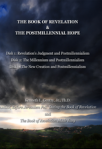 The Book of Revelation and Postmillennialism (Lectures by Ken Gentry)
The Book of Revelation and Postmillennialism (Lectures by Ken Gentry)
In the first of these three 50-minute lectures Gentry explains Revelation’s judgments to show they do not contradict postmillennialism. In the next two lectures he shows how the Millennium and the New Creation themes strongly support the gospel victory hope found in postmillennialism.
See more study materials at: www.KennethGentry.com
Given its own historical context, Numbers 6 cannot serve as a binding obligation upon believers today. This provides further evidence of the precarious nature of the anti-alcohol moral argument.
Judges 13:4
This passage is short and to the point in the prohibitionist argument. It reads: “Now therefore, be careful not to drink wine or strong drink, nor eat any unclean thing.”
From time to time anti-alcohol advocates will point to this text as an example of a commendable lifestyle which Scripture encourages. In fact, the call to “be careful not to drink wine or strong drink” is precisely the ethical ideal of abstentionist and prohibitionist Christians.
Unfortunately, though, reading the exhortation in its context clearly shows that this is a quite narrowly focused command. The angel of the Lord is speaking to Monoah’s wife about her future child, Samson. He will be an unusually gifted judge in Israel with a peculiar ministry:
“And there was a certain man of Zorah, of the family of the Danites, whose name was Manoah; and his wife was barren and had borne no children. Then the angel of the Lord appeared to the woman, and said to her, Behold now, you are barren and have borne no children, but you shall conceive and give birth to a son. Now therefore, be careful not to drink wine or strong drink, nor eat any unclean thing. For behold, you shall conceive and give birth to a son, and no razor shall come upon his head, for the boy shall be a Nazirite to God from the womb; and he shall begin to deliver Israel from the hands of the Philistines.” (Judges 13:2-5 )
Since this command is quite particular and limited, universally applying it would be a travesty of exposition. Samson will be a perpetual Nazirite under ceremonial Naziritic proscriptions.
[image error]For more information and to order click here.
" data-image-caption="" data-medium-file="https://postmillennialworldview.com/w..." data-large-file="https://postmillennialworldview.com/w..." tabindex="0" role="button" class="alignright size-full wp-image-495" src="https://postmillennialworldview.com/w..." alt="" />God Gave Wine (by Ken Gentry)
A biblical defense of moderate alcohol consumption. Considers all key biblical passages and engages the leading objections.
See more study materials at: www.KennethGentry.com
To be continued. I know what you are thinking: “I’ll drink to that.”
Reformed Eschatology in the Writings of Geerhardus Vos
Ed. by Ken Gentry and Bill Boney
This is a collection of several key eschatological studies by the renowned Reformed theologian Geehardus Vos. We have modernized Vos’ grammar and syntax and updated his layout style according to modern publishing conventions (shorter sentences and paragraphs). We did this without changing any of Vos’ arguments.
For information on the upcoming Geerhardus Vos work or to pre-order it, see:
https://axeheadpress.com/pages/coming-soon-vos
September 20, 2024
DOES GOD OPPOSE ALCOHOL? (1)
 PMW 2024-074 by Kenneth L. Gentry, Jr.
PMW 2024-074 by Kenneth L. Gentry, Jr.
In this new five-part series I will focus on a pesky biblical worldview question: Does the Bible condemn alcohol use? I believe it does not, for even Jesus turned water into wine. But the approach I will take in this series is to consider the leading passages that some evangelicals believe condemn alcohol consumption. Several biblical passages seem upon cursory reading to imply that all wine drinking is prohibited. I will focus on the nine most prominent passages employed in the argument against imbibing. I will provide brief explanatory statements showing that these passages perfectly harmonize with my statement that God does not prohibit is consumption.
Leviticus 10:8–11 reads:
The LORD then spoke to Aaron, saying, “Do not drink wine or strong drink, neither you nor your sons with you, when you come into the tent of meeting, so that you may not die — it is a perpetual statute throughout your generations — and so as to make a distinction between the holy and profane, and between the unclean and the clean, and so as to teach the sons of Israel all the statutes which the LORD has spoken to them through Moses.”
This passage clearly institutes as a “perpetual statute” that members of the Aaronic priesthood should not drink alcoholic beverages when they enter the tabernacle.
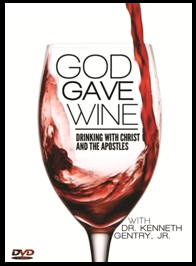 God Gave Wine Lectures
God Gave Wine Lectures
By Ken Gentry
Professionally-produced, four-part doculecture series, engages a hotly-debated issue within the Christian church: the question of the Christian and alcoholic beverages. Presents and defends the case for a moderate consumption of alcoholic beverages by Christians.
For more biblical studies, see: KennethGentry.com
Notice the Qualifications
Nevertheless, against those attempting to use this passage in the present debate, we must note two important qualifications. (1) This prohibition applies only to the priest in the priesthood (Aaron and his sons). And (2) only forbids the use of alcoholic beverages when actually engaging in the priestly function. Josephus notes that “as for the priests, [Moses] prescribed to them a double degree of purity” (Ant. 3:12:1). This special purity includes the following: “nor are they permitted to drink wine so long as they wear those garments” (Ant. 3:12:2). The priests only wore their “sacerdotal garments” (Ant. 3:12:2) while ministering: “when he enters the holy place” (Exo. 28:2-4, 29), “when he goes in before the Lord” (Exo. 28:30), “when he ministers” (Exo. 28:35), “when they approach the altar to minister in the holy place” (Exo. 28:43).
Apparently God provides this legislation as a safety valve for the priesthood, to prevent any accidental profanation of the tabernacle service. The context seems to demand such an interpretation, for in Leviticus 10:1 we read: “Now Nadab and Abihu, the sons of Aaron, took their respective firepans, and after putting fire in them, placed incense on it and offered strange fire before the LORD, which He had not commanded them.”
Verses 2 and 3 give the result of such profaning of the priestly function, and God’s reason for such severe punishment:
And fire came out from the presence of the LORD and consumed them, and they died before the LORD. Then Moses said to Aaron, “It is what the LORD spoke, saying, ‘By those who come near Me I will be treated as holy, And before all the people I will be honored.’” So Aaron, therefore, kept silent.
Nadab and Abihu die because they offered things on the altar God did not command. Consequently, the priest must be extremely careful that he follow God’s stipulations in the holy service. Were the priest allowed to drink just before or during a priestly service, his mind might not carefully follow God’s order of service (cp. Hos 4:11).
Thus, this passage has nothing to do with us today, since we are not of the Aaronic priesthood, which has passed away (cf. Hebrews 9 and 10).
A New Testament Application?
Despite these observations some argue that this prohibition remains incumbent upon New Testament era believers because we are “kings and priests” (cf. e.g., 1 Pet. 2:5, 9; Rev. 1:6). I will cite the arguments of two representatives of this strained but widespread position. One is prohibitionist Stephen Reynolds; the other is an abstentionist, Gleason L. Archer; both are evangelical scholars of great knowledge. In Reynolds’s case the focus is not on the present passage, but on Proverbs 31:4–5, which forbids kings to drink. The manner and assumptions of the arguments of both men are the same, however.
Debate on Use of Alcohol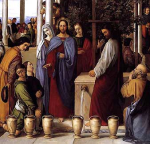
Downloadable mp3
In this radio broadcast debate Gentry engages the president of the National Templar’s Society on the question of whether it is ever acceptable for a Christian to drink alcohol. Provides helpful insights into both sides of the issue.
See more study materials at: www.KennethGentry.com
Referring to Revelation 1:6 (which teaches that believers are “kings and priests”), Reynolds states:
“It follows, if we accept this reading [i.e., the Textus Receptus], that all Bible believers must be abstainers, since what was required of kings in the Old Testament is required of kings under the New.” In the next paragraph he adds: “If ancient kings were warned not to drink intoxicants lest they forget the law, modern believers who wish to keep God’s law in their heart, should accept this prohibition as binding on themselves.” In a similar vein, and with an identical spiritual non sequitur, Archer informs us that “this has implications for the New Testament priesthood of all believers (1 Peter 2:9) and suggests that they may be seriously handicapped in carrying on the work of soulwinning if they personally indulge in the use of alcohol.”
This methodology is inappropriate due to a number of problems. A few brief observations will illustrate the spurious nature of such an application of Scripture:
First, if such methodology were proper, both of these provisions (relating to both priests and kings) would witness against our High Priest and King of kings, Jesus Christ. As I show in the preceding chapter, Jesus does partake of wine. This evidence alone exposes the argument’s reductio ad absurdum.
Second, even in the Old Testament this spiritual truth (that believers are kings and priests) is true. The Old Testament background for both 1 Peter 2:5, 9 and Revelation 1:6 is Exodus 19:6, which reads: “You shall be a kingdom of priests.” Yet the Old Testament clearly permits Israelites to manufacture, sell, and drink wine.
Third, both the priestly and kingly prohibitions have implied limitations: the prohibition is in effect during the actual exercise of official powers. Leviticus 10:9 particularly commands: “Do not drink wine or strong drink . . . when you come into the tent of meeting.” A similar limitation is strongly implied in the rationale for the prohibition upon kings in Proverbs 31:5: “Lest they drink and forget what is decreed, and pervert the rights of all the afflicted.” The perversion of rights could only come about with official sanction, i.e., while acting magisterially or judicially. God prohibits wine-drinking in these limited contexts in order to prevent the frequent corruption of justice brought about by kings who function magisterially while intoxicate (e.g., Isa. 28:7). Biblical law does not forbid wine to kings permanently and universally (cf. Gen. 14:18-20).
Reformed Eschatology in the Writings of Geerhardus Vos
Ed. by Ken Gentry and Bill Boney
This is a collection of several key eschatological studies by the renowned Reformed theologian Geehardus Vos. We have modernized Vos’ grammar and syntax and updated his layout style according to modern publishing conventions (shorter sentences and paragraphs). We did this without changing any of Vos’ arguments.
For information on the upcoming Geerhardus Vos work or to pre-order it, see:
https://axeheadpress.com/pages/coming-soon-vos
The most we can say of such an argument is that while in the process of carrying on the work of soulwinning, the believer as a priest to God should not drink. Or while elders are judicially pursuing church discipline, they are acting as kings and should not imbibe.
Fourth, if we allow such a hermeneutic, what sense could we make of Paul’s requirements for the eldership and diaconate? Earlier we saw how the prerequisites specifically exclude only those “addicted to much wine” (1 Tim. 3:8) and those “addicted to wine” (v. 3). Furthermore, how could we understand Paul’s “be not drunk with wine”? Why did he not say, “Do not drink wine”?
[image error]For more information and to order click here.
" data-image-caption="" data-medium-file="https://postmillennialworldview.com/w..." data-large-file="https://postmillennialworldview.com/w..." tabindex="0" role="button" class="alignright size-full wp-image-495" src="https://postmillennialworldview.com/w..." alt="" />God Gave Wine (by Ken Gentry)
A biblical defense of moderate alcohol consumption. Considers all key biblical passages and engages the leading objections.
See more study materials at: www.KennethGentry.com
Stay tuned for part 2 of this study in my next article.
September 17, 2024
VOS ON THE RESURRECTION-BODY
 PMW 2024-073 by Geerhardus Vos
PMW 2024-073 by Geerhardus Vos
Gentry Note:
This is part 2 of a two-part study on the believer’s resurrection by Geerhardus Vos. Vos is helpful for countering the heretical arguments of some who deny or greatly alter the historic Christian doctrine of the resurrection of the body. The only changes I will make to Vos’ article is to break it into smaller paragraphs to make it easier to read for a modern audience.
VOS ON THE RESURRECTION BODY
The main passage informing us as to the nature of the resurrection body is 1 Corinthians 15:35–58. The difficulty Paul here seeks to relieve does not concern the substance of the future body, but its kind (compare 1 Corinthians 15:35 “With what manner of body do they come?”). Not until 1 Corinthians 15:50 is the deeper question of difference in substance touched upon. The point of the figure of “sowing” is not that of identity of substance, but rather this, that the impossibility of forming a concrete conception of the resurrection body is no proof of its impossibility, because in all vegetable growth there appears a body totally unlike that which is sown, a body the nature and appearance of which are determined by the will of God. We have no right to press the figure in other directions, to solicit from it answers to other questions.
That there is to be a real connection between the present and the future body is implied rather than directly affirmed. 1 Corinthians 15:36 shows that the distinction between the earthly body and a germ of life in it, to be entrusted with it to the grave and then quickened at the last day, does not lie in the apostle’s mind, for what is sown is the body; it dies and is quickened in its entirety. Especially the turn given to the figure in 15:37—that of a naked grain putting on the plant as a garment—proves that it is neither intended nor adapted to give information on the degree of identity or link of continuity between the two bodies. The “bare grain” is the body, not the spirit, as some would have it (Teichmann), for it is said of the seed that it dies; which does not apply to the Pneuma (compare also 15:44). The fact is that in this entire discussion the subjective spirit of the believer remains entirely out of consideration; the matter is treated entirely from the standpoint of the body. So far as the Pneuma enters into it, it is the objective Spirit, the Spirit of Christ.
THE APOCALYPSE OF JOHN
by Milton S. Terry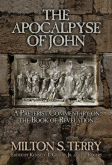
This book is Terry’s preterist commentary on the Book of Revelation. It was originally the last half of his much larger work, Biblical Apocalyptics. It is deeply-exegetical, tightly-argued, and clearly-presented.
For more study materials: https://www.kennethgentry.com/
As to the time of the sowing, some writers take the view that this corresponds to the entire earthly life, not to the moment of burial only (so already Calvin, recently Teichmann and Charles). In 15:42, 43 there are points of contact for this, inasmuch as especially the three last predicates “in dishonor,” “in weakness,” “a natural body,” seem more applicable to the living than to the dead body. At any rate, if the conception is thus widened, the act of burial is certainly included in the sowing. The objection arising from the difficulty of forming a conception of the resurrection body is further met in 15:39–41, where Paul argues from the multitude of bodily forms God has at His disposal. This thought is illustrated from the animal world (15:39); from the difference between the heavenly and the earthly bodies (15:40); from the difference existing among the heavenly bodies themselves (15:41).
The structure of the argument is indicated by the interchange of two words for “other,” allos and heteros, the former designating difference of species within the genus, the latter difference of genus, a distinction lost in the English version. In all this the reasoning revolves not around the substance of the bodies but around their kind, quality, appearance (sarx in 15:39 = soma, “body,” not = “flesh”). The conclusion drawn is that the resurrection body will differ greatly in kind from the present body. It will be heteros, not merely allos.
Reformed Eschatology in the Writings of Geerhardus Vos
Ed. by Ken Gentry and Bill Boney
This is a collection of several key eschatological studies by the renowned Reformed theologian Geehardus Vos. We have modernized Vos’ grammar and syntax and updated his layout style according to modern publishing conventions (shorter sentences and paragraphs). We did this without changing any of Vos’ arguments.
For information on the upcoming Geerhardus Vos work or to pre-order it, see:
https://axeheadpress.com/pages/coming-soon-vos
The points of difference are enumerated in 15:42, 43. Four contrasts are named; the first three in each case appear to be the result of the fourth. The dominating antithesis is that between the soma psuchikon and the soma pneumatikon. Still Paul can scarcely mean to teach that “corruption,” “dishonor,” “weakness” are in the same sense necessary and natural results of the “psychical” character of the earthly body, as the corresponding opposites are necessary and natural concomitants of the pneumatic character of the resurrection body. The sequel shows that the “psychical body” was given man at creation, and according to 15:53 corruption and death go together, whereas death is not the result of creation but of the entrance of sin according to Paul’s uniform teaching elsewhere.
Olivet Discourse Made Easy (by Ken Gentry)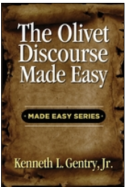
Verse-by-verse analysis of Christ’s teaching on Jerusalem’s destruction in Matt 24. Shows the great tribulation is past, having occurred in AD 70, and is distinct from the Second Advent at the end of history. Provides exegetical reasons for a transition from AD 70 to the Second Advent at Matthew 24:36.
See more study materials at: www.KennethGentry.com
Hence, also the predicate sarkikos is avoided in 15:46, 47, where the reference is to creation, for this word is always associated in Paul with sin. The connection, therefore, between the “natural (psychical, margin) body” and the abnormal attributes conjoined with it, will have to be so conceived, that in virtue of the former character, the body, though it need not of itself, yet will fall a prey to the latter when sin enters. In this lies also the explanation of the term “psychical body.” This means a body in which the psuche, the natural soul, is the vitalizing principle, sufficient to support life, but not sufficient to that supernatural, heavenly plane, where it is forever immune to death and corruption.
The question must be asked, however, why Paul goes back to the original state of man’s body and does not content himself with contrasting the body in the state of sin and in the state of eternal life. The answer is found in the exigency of the argument. Paul wished to add to the argument for the possibility of a different body drawn from analogy, an argument drawn from the typical character of the original creation-body. The body of creation, on the principle of prefiguration, pointed already forward to a higher body to be received in the second stage of the world-process: “if there exists a psychical body, there exists also a pneumatic body” (15:44). The proof lies in Genesis 2:7.
Some think that Paul here adopts the Philonic doctrine of the creation of two men, and means 1 Corinthians 15:45 b as a quotation from Genesis 1:27. But the sequence is against this, for Paul’s spiritual man appears on the scene last, not first, as in Philo. Nor can the statement have been meant as a correction of Philo’s sequence, for Paul cannot have overlooked that, once a double creation were found in Genesis 1 and 2, then Philo’s sequence was the only possible one, to correct which would have amounted to correcting Scripture. If Paul does here correct Philo, it must be in the sense that he rejects the entire Philonic exegesis, which found in Genesis a twofold creation (compare 1 Corinthians 11:7).
Evidently for Paul, Genesis 2:7 taken by itself contains the proof of his proposition, that there is both a psychical and a pneumatic body. Paul regarded the creation of the first Adam in a typical light. The first creation gave only the provisional form in which God’s purpose with reference to man was embodied, and in so far looked forward to a higher embodiment of the same idea on a higher pneumatic plane (cf. Romans 5:14): “The first man is of the earth, earthy: the second man is of heaven” (1 Corinthians 15:47); “of” or “from heaven” does not designate heavenly material, for even here, by not giving the opposite to choikos, “earthly,” Paul avoided the question of substantiality.
A “pneumatic” body is not, as many assume, a body made out of pneuma as a higher substance, for in that case Paul would have had pneumatikon ready at hand as the contrast to choikon. Only negatively the question of substance is touched upon in 1 Corinthians 15:50: “Flesh and blood cannot inherit the kingdom of God,” but the apostle does not say what will take their place. Compare further, for the non-substantial meaning of pneumatikos, Romans 15:27; 1 Corinthians 9:11; 10:3; Ephesians 1:3; 5:19; 6:12; Colossians 1:9. The only positive thing which we learn in this direction is formal, namely, that the resurrection body of the believer will be the image of that of Christ (1 Corinthians 15:49).
Click on the following images for more information on these studies:



September 13, 2024
VOS ON THE RESURRECTION OF BELIEVERS
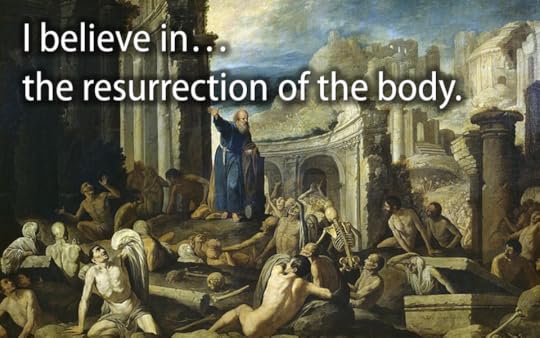 PMW 2024-072 by Geerhardus Vos
PMW 2024-072 by Geerhardus Vos
Gentry Note:
The preterist hermeneutic is a helpful tool for understanding many New Testament prophecies. But it is a tool that for some folks what has some sort of addictive power that leads them off into error. In fact, it has led hundreds of folks into heresy, even denying the historic Christian doctrine of the resurrection of the body. A helpful antidote to such confused thinking can be found in the writings of Geerhardus Vos, among others. In this two-part series, I will post a couple of major points from Vos’ “Eschatology of the New Testament.” The only changes I will make to Vos’ article is to break it into smaller paragraphs, since he wrote in a day when paragraphs were virtually book length! So, let’s get started with Vos’ observations.
Vos on the Resurrection
The resurrection of believers bears a twofold aspect. On the one hand it belongs to the forensic side of salvation. On the other hand it belongs to the pneumatic transforming side of the saving process. Of the former, traces appear only in the teaching of Jesus (Matthew 5:9; 22:29–32; Luke 20:35, 36). Paul clearly ascribes to the believer’s resurrection a somewhat similar forensic significance as to that of Christ (Romans 8:10, 23; 1 Corinthians 15:30–32, 55–58). Far more prominent with him is, however, the other, the pneumatic interpretation. Both the origin of the resurrection life and the continuance of the resurrection state are dependent on the Spirit (Romans 8, 10, 11; 1 Corinthians 15:45–49; Galatians 6:8). The resurrection is the climax of the believer’s transformation (Romans 8:11; Galatians 6:8).
Why Not Full-Preterism? by Steve Gregg
This work exposes some of the key flaws in Hyperpreterism by someone who has formally debated them. Much insightful material for those who might be tempted to forsake historic Christian orthodoxy.
For more Christian educational materials: www.KennethGentry.com
This part ascribed to the Spirit in the resurrection is not to be explained from what the Old Testament teaches about the Spirit as the source of physical life, for to this the New Testament hardly ever refers; it is rather to be explained as the correlate of the general Pauline principle that the Spirit is the determining factor of the heavenly state in the coming eon. This pneumatic character of the resurrection also links together the resurrection of Christ and that of the believer. This idea is not yet found in the Synoptics; it finds expression in John 5:22–29; 11:25; 14:6, 19. In early apostolic teaching a trace of it may be found in Acts 4:2.
With Paul it appears from the beginning as a well-established principle. The continuity between the working of the Spirit here and His part in the resurrection does not, however, lie in the body. The resurrection is not the culmination of a pneumatic change which the body in this life undergoes. There is no preformation of the spiritual body on earth. Romans 8:10, 11; 1 Corinthians 15:49; 2 Corinthians 5:1, 2; Philippians 3:12 positively exclude this, and 2 Corinthians 3:18; 4:7–18 do not require it. The glory into which believers are transformed through the beholding (or reflecting) of the glory of Christ as in a mirror is not a bodily but inward glory, produced by illumination of the gospel. And the manifestation of the life of Jesus in the body or in the mortal flesh refers to the preservation of bodily life in the midst of deadly perils.
Reformed Eschatology in the Writings of Geerhardus Vos
Ed. by Ken Gentry and Bill Boney
This is a collection of several key eschatological studies by the renowned Reformed theologian Geehardus Vos. We have modernized Vos’ grammar and syntax and updated his layout style according to modern publishing conventions (shorter sentences and paragraphs). We did this without changing any of Vos’ arguments.
For information on the upcoming Geerhardus Vos work or to pre-order it, see:
https://axeheadpress.com/pages/coming-soon-vos
Equally without support is the view that at one time Paul placed the investiture with the new body immediately after death. It has been assumed that this, together with the view just criticized, marks the last stage in a protracted development of Paul’s eschatological belief. The initial stage of this process is found in 1 Thessalonians: the resurrection is that of an earthly body. The next stage is represented by 1 Corinthians: the future body is pneumatic in character, although not to be received until the parousia. The third stage removes the inconsistency implied in the preceding position between the character of the body and the time of its reception, by placing the latter at the moment of death (2 Corinthians, Romans, Colossians), and by an extreme flight of faith the view is even approached that the resurrection body is in process of development now (Teichmann, Charles). This scheme has no real basis of fact.
[image error]Why I Left Full-Preterism (by Samuel M. Frost)
Former leader in Full Preterist movement, Samuel M. Frost, gives his testimony and theological reasoning as to why he left the heretical movement. Good warning to others tempted to leave orthodox Christianity.
See more study materials at: KennethGentry.com
First Thessalonians does not teach an unpneumatic eschatology (compare 4:14, 16). The second stage given is the only truly Pauline one, nor can it be shown that the apostle ever abandoned it. For the third position named finds no support in 2 Corinthians 5:1–10; Romans 8:19; Colossians 3:4. The exegesis of 2 Corinthians 5:1–10 is difficult and cannot here be given in detail. Our understanding of the main drift of the passage, put into paraphrase, is as follows: we feel assured of the eternal weight of glory (4:17), because we know that we shall receive, after our earthly tent-body shall have been dissolved (aorist subjunctive), a new body, a supernatural house for our spirit, to be possessed eternally in the heavens.
A sure proof of this lies in the heightened form which our desire for this future state assumes. For it is not mere desire to obtain a new body, but specifically to obtain it as soon as possible, without an intervening period of nakedness, i.e. of a disembodied state of the spirit. Such would be possible, if it were given us to survive till the parousia, in which case we would be clothed upon with our habitation from heaven (=supernatural body), the old body not having to be put off first before the new can be put on, but the new body being superimposed upon the old, so that no “unclothing” would have to take place first, what is mortal simply being swallowed up of life (5:2, 4). And we are justified in cherishing this supreme aspiration, since the ultimate goal set for us in any case, even if we should have to die first and to unclothe and then to put on the new body over the naked spirit, since the ultimate goal, I say, excludes under all circumstances a state of nakedness at the moment of the parousia (5:3).
Since, then, such a new embodied state is our destiny in any event, we justly long for that mode of reaching it which involves least delay and least distress and avoids intermediate nakedness. (This on the reading in 5:3 of ei ge kai endusamenoi ou gumnoi heurethesometha. If the reading ei ge kai ekdusamenoi be adopted the rendering of 5:3 will have to be: “If so be that also having put off (i.e. having died), we shall not at the end be found naked.” If eiper kai ekdusamenoi be chosen it will be: “Although even having put off (i.e. having died) we shall not at the end be found naked.” These other readings do not materially alter the sense.) The understanding of the passage will be seen to rest on the pointed distinction between being “clothed upon,” change at the parousia without death (5:2, 4), to be “unclothed,” loss of the body in death with nakedness resulting (5:4), and “being clothed,” putting on of the new body after a state of nakedness (5:3).
Interpreted as above, the passage expresses indeed the hope of an instantaneous endowment with the spiritual body immediately after this life, but only on the supposition that the end of this life will be at the parousia, not for the case that death should intervene before, which latter possibility is distinctly left open. In Romans 8:19 what will happen at the end to believers is called a “revealing of the sons of God,” not because their new body existed previously, but because their status as sons of God existed before, and this status will be revealed through the bestowal upon them of the glorious body. Colossians 3:3 speaks of a “life … hid with Christ in God,” and of the “manifestation” of believers with Christ in glory at the parousia, but “life” does not imply bodily existence, and while the “manifestation” at the parousia presupposes the body, it does not imply that this body must have been acquired long before, as is the case with Christ’s body. In conclusion it should be noted that there is ample evidence in the later epistles that Paul continued to expect the resurrection body at the parousia (2 Corinthians 5:10; Philippians 3:20, 21).
Gentry conclusion
In my next posting, I will present Vos’ study on the resurrection-body itself. If you don’t believe, just check back and I will prove it!
September 10, 2024
VOS INTRODUCTION TO THE TWO AGES
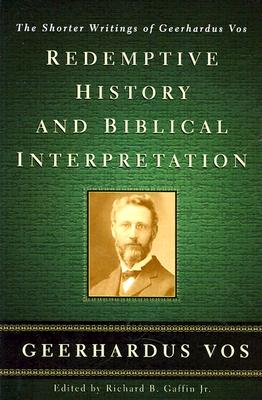 PMW 2024-071 by Geerhardus Vos
PMW 2024-071 by Geerhardus Vos
Gentry introductory note:
This article includes a portion of Geerhardus Vos’s “The Eschatology of the New Testament.” Herein Vos provides us with a helpful introduction to the Two Age structure of redemptive history. Too many Internet theologues are confused on the matter and therefore confused on New Testament eschatology itself. And some have even abandoned historic Christian orthodoxy on the matter. Thus, they even deny the bodily resurrection at the end of history — because they deny an end to history!
Though Vos is a vigorous amillennialist, this is not a necessary result of the Two Age doctrine. Rather it is a possible result. The Two Age view is widely held, especially in Reformed circles. We can see this at work among Reformed postmillennialists such as B. B. Warfield, John Murray, Greg Bahnsen, Keith Mathison, and others. For example, see: https://wordpress.com/post/postmillennialworldview.com/18460
I have a new book (co-edited with my good friend and Vos enthusiast, Bill Boney) titled: Reformed Eschatology of Geerhardus Vos. It is a collection of Vos’ eschatological studies that have been updated in terms of style and grammar. See: https://postmillennialworldview.com/2024/06/21/new-book-on-geerhardus-vos-eschatology/ But now, What saith Vos?
Vos’ “Course of Development” section
In New Testament eschatological teaching a general development in a well-defined direction is traceable. The starting-point is the historico-dramatic conception of the two successive ages. These two ages are distinguished as houtos ho aion, ho nun aion, ho enesios aion, “this age,” “the present age” (Matthew 12:32; 13:22; Luke 16:8; Romans 12:2; 1 Corinthians 1:20; 2:6, 8; 3:18; 2 Corinthians 4:4; Galatians 1:4; Ephesians 1:21; 2:2; 6:12; 1 Timothy 6:17; 2 Timothy 4:10; Titus 2:12), and ho aion ekeinos, ho aion mellon, ho aion erchomenos, “that age,” “the future age” (Matthew 12:32; Luke 18:30; 20:35; Ephesians 2:7; Hebrews 6:5).
In Jewish literature before the New Testament, no instances of the developed antithesis between these two ages seem to be found, but from the way in which it occurs in the teaching of Jesus and Paul it appears to have been current at that time. (The oldest undisputed occurrence is a saying of Johanan ben Zaqqay, about 80 AD.) The contrast between these two ages is (especially with Paul) that between the evil and transitory, and the perfect and abiding. Thus, to each age belongs its own characteristic order of things, and so the distinction passes over into that of two “worlds” in the sense of two systems (in Hebrew and Aramaic the same word ‘olam, ‘olam, does service for both, in Greek aion usually renders the meaning “age,” occasionally “world” (Hebrews 1:2; 11:3), kosmos meaning “world”; the latter, however, is never used of the future world). Compare Dalman, Die Worte Jesu, 1:132–146.
Broadly speaking, the development of New Testament eschatology consists in this, that the two ages are increasingly recognized as answering to two spheres of being which coexist from of old, so that the coming of the new age assumes the character of a revelation and extension of the supernal order of things, rather than that of its first entrance into existence. Inasmuch as the coming world stood for the perfect and eternal, and in the realm of heaven such a perfect, eternal order of things already existed, the reflection inevitably arose that these two were in some sense identical. But the new significance which the antithesis assumes does not supersede the older historico-dramatic form. The higher world so interposes in the course of the lower as to bring the conflict to a crisis.
The Reformed Eschatology of Geerhardus Vos[image error]
Ed. by Ken Gentry and Bill Boney
This collection of several key eschatological studies by the renowned theologian Geehardus Vos will be published in late Summer or early Fall 2024. We have modernized Vos’ grammar and syntax and updated his publications according to modern style conventions (shorter sentences and paragraphs).
For information on the upcoming Geerhardus Vos work, see:
https://axeheadpress.com/pages/coming-soon-vos
The passing over of the one contrast into the other, therefore, does not mark, as has frequently been asserted, a recession of the eschatological wave, as if the interest had been shifted from the future to the present life. Especially in the Fourth Gospel this “de-eschatologizing” process has been found, but without real warrant. The apparent basis for such a conclusion is that the realities of the future life are so vividly and intensely felt to be existent in heaven and from there operative in the believer’s life, that the distinction between what is now and what will be hereafter enjoyed becomes less sharp. Instead of the supersedure of the eschatological, this means the very opposite, namely, its most real anticipation.
 Reformed Eschatology in the Writings of Geerhardus Vos, edited by Kenneth L. Gentry, Jr. and Bill Boney, is available for pre-orders now. https://axeheadpress.com/products/reformed-eschatology-in-the-writings-of-geerhardus-vos
Reformed Eschatology in the Writings of Geerhardus Vos, edited by Kenneth L. Gentry, Jr. and Bill Boney, is available for pre-orders now. https://axeheadpress.com/products/reformed-eschatology-in-the-writings-of-geerhardus-vos
It should further be observed that the development in question is intimately connected and keeps equal pace with the disclosure of the preexistence of Christ, because this fact and the descent of Christ from heaven furnished the clearest witness to the reality of the heavenly order of things. Hence, it is especially observable, not in the earlier epistles of Paul, where the structure of eschatological thought is still in the main historico-dramatic, but in the epistles of the first captivity (Ephesians 1:3, 10–22; 2:6; 3:9, 10; 4:9, 10; 6:12; Philippians 2:5–11; 3:20; Colossians 1:15, 17; 3:2; further, in Hebrews 1:2, 3; 2:5; 3:4; 6:5, 11; 7:13, 16; 9:14; 11:10, 16; 12:22, 23).
The Fourth Gospel marks the culmination of this line of teaching, and it is unnecessary to point out how here the contrast between heaven and earth in its Christological consequences determines the entire structure of thought. But here it also appears how the last outcome of the New Testament progress of doctrine had been anticipated in the highest teaching of our Lord. This can be accounted for by the inherent fitness that the supreme disclosures which touch the personal life of the Savior should come not through any third person, but from His own lips.
Thine Is the Kingdom
(ed. by Ken Gentry)
Contributors lay the scriptural foundation for a biblically-based, hope-filled postmillennial eschatology, while showing what it means to be postmillennial in the real world.
See more study materials at: www.KennethGentry.com
September 6, 2024
INTRODUCING THE TWO WITNESSES (5)
 PMW 2024-070 by Kenneth L. Gentry, Jr.
PMW 2024-070 by Kenneth L. Gentry, Jr.
Though this is my fifth study on the identity of John’s two witnesses, I come now to my fourth point. This should be read in tandem with the preceding study.
Fourth, further confirming this approach is the two witnesses’ prophetic fire-and-blood imagery (11:5– 6; cp. Eze 21:32; 38:22; Joel 2:30), the joyful reaction to their death by “those who dwell in the Land [of Israel]” (11:7, 9–10), and the “torment” they cause their Jerusalem hearers (11:10; cf. v 8). The temple and Jerusalem will suffer fiery destruction (Mt 22:7; Ac 2:19–20). The witnesses are not simply gospel preachers, or else they would not be deemed tormentors. Rather, they are functioning as covenant-lawsuit prophets challenging the integrity of the central feature of Judaism: the temple. In Revelation the word-group for “torment” elsewhere speaks of extreme pain and agony, not annoyance or frustration. Thus, some scholars argue that “the two witnesses do not symbolize the preaching of the Gospel in general . . . They are the incarnation of the witness which the Church renders to Christ in the face of a Judaism grown obstinate in its unbelief.”
I would add to this observation that their witness promotes the word of Christ against the temple which the Jews so dearly love, and which figures prominently in Christ’s trial (Mt 26:59–61; 27:40; Mk 14:58–59), as well as in Stephen’s (Ac 6:13–14). Another observes in this regard that: “well may we suppose that Christians . . . urged the declarations of the Saviour as to the impending fate of Jerusalem.” He points out (2:227) that the two witnesses “were prophets in the church, predicting the destruction of the temple and the Jewish commonwealth.” Elsewhere we learn that: “putting the synoptic and Johannine evidence together — and the two appear to be independent — we have a strong presumption that Jesus did say something about the destruction and replacement of the temple.”
The extreme Jewish zeal for the temple is well-known and amply documented in ancient sources: 1 Macc 2:19–22; 3:12; 5:15; 14:31; Aristeas 83–87; Philo, Spec. Laws 1:13 §72–73; Embassy 29 §191, 198; Jos., Ant. 13:3:4 §77–78; J.W. 6:4:7–8 §260–67. They fiercely protect their holiest place, as we see in: Philo (Embassy 32 §232–33), Josephus (Ant. 14:16:2 §470; 17:6:2 §151–52; 18:8:2–3 §261–72; J.W. 2:9:4 §175–77; 4:3:9–10 §158–92; 6:1:7 §73–74; 6:4:5 §253), Tacitus (His. 5:9), Dio (49:22:3–5; 69:12:1–2), and 2 Macc 15:18; 18:20ff.
This is why that after Stephen’s preaching against the temple (Ac 7:48–50) and Israel (Ac 7:51–53), the Jews turn violently upon him: “Now when they heard this, they were cut to the quick [lit. “to the hearts,” tais kardiais], and they began gnashing their teeth at him. . . . They cried out with a loud voice, and covered their ears and rushed at him with one impulse. When they had driven him out of the city, they began stoning him; and the witnesses laid aside their robes at the feet of a young man named Saul” (Ac 7:54, 57–58). They consider Stephen’s preaching torment (“they were cut to the quick,” Ac 7:54), not annoying (as for example in Ac 2:13, and among the Gentiles at Ac 17:18, 32), which matches with the tormented anger of those in Jerusalem against the two witnesses (Rev. 11:10c).
House Divided: The Break-up of Dispensational Theology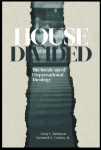 By Greg Bahnsen and Ken Gentry
By Greg Bahnsen and Ken Gentry
This book presents and defends Christian Reconstruction theology, particularly theonomic ethics and postmillennial eschatology. It does to by responding to dispensationalism’s social and exegetical theology.
For more educational materials: www. KennethGentry.com
Fifth, most scholars agree that John specifically models the two witnesses after Moses and Elijah (11:5–6; cp. 1Ki 17:1; Ex 7:17), who represent the law and the prophets, i.e., the old covenant (Mt 5:17; 7:12; 11:13; 31:42; 22:40; Lk 24:44; Jn 1:45; Ac 13:15; 24:14; 26:22–23; 28:13). The law and the prophets testify about Christ (Mt 26:54–56; Jn 5:39; Lk 24:25-27) and against Israel (Mt 15:7–9; Lk 16:31; Jn 5:45–47; Ac 13:27). For instance, Jesus warns Israel: “Do not think that I will accuse you before the Father; the one who accuses you is Moses, in whom you have set your hope” (Jn 5:45; cp. Jn 7:19–20). He declaims their treatment of the prophets God sends to them: “you testify against yourselves, that you are sons of those who murdered the prophets” (Mt 23:31; cp. 5:12).
Sixth, further indicating that the two prophets speak of judgment on geo-political Israel — and especially on their holy temple and capital city — is the heavenly response to their ministry under Israel’s resistance. Upon their deaths and their reception into heaven (11:11–13) we hear that the kingdom of the Lord has conquered — despite Israel’s opposition to Christ and his two prophets — and that “Christ . . . will reign forever” (11:15). This kingdom victory of Christ comes as a “reward” to “Your bond-servants the prophets” (11:18). Then as a consequence of the casting out of the earthly temple and the trampling of its host city, Jerusalem (11:2), along with the two witnesses’ prophetic denunciation of the temple, the heavenly temple opens (11:18). The message of the two witness-prophets prevails.
Seventh, in the vision’s imagery, the two prophets engage in fiery speech: fire “flows out of their mouth and devours their enemies” (11:5). This well fits the idea of judgment language: Jeremiah’s proclaiming God’s judgment on Israel makes his words a fire (Jer 5:14). The general theme of fiery judgment regarding Christ’s coming is familiar to the first Christians, both in speaking of his metaphorical coming in wrath in AD 70 and his literal coming in judgment at the end of history (e.g., Ac 2:19; 2Th 1:7; Heb 10:27; Jas 5:3, 9; 2Pe 3:7; Jude 7). In fact, such fiery-judgment language is prominent enough in early Christianity that Nero accuses Christians of causing the burning of Rome. In AD 64 he condemns them on “the charge of [being] incendiaries” and then “fastened [them] to crosses to be set on fire, that when the darkness fell they might be burned to illuminate the night” (Tac., Ann. 15:44). In the exposition of Revelation 13 I will show how the Jews urge Nero’s persecution of Christians.
[image error]For more information and to order click here.
" data-image-caption="" data-medium-file="https://postmillennialworldview.com/w..." data-large-file="https://postmillennialworldview.com/w..." tabindex="0" role="button" class="alignright size-full wp-image-209" src="https://postmillennialworldview.com/w..." alt="Navigating the Book of Revelation: Special Studies on Important Issues" />Navigating the Book of Revelation (by Ken Gentry)
Technical studies on key issues in Revelation, including the seven-sealed scroll, the cast out temple, Jewish persecution of Christianity, the Babylonian Harlot, and more.
See more study materials at: www.KennethGentry.com
Eighth, we also know from Jewish records that the early Christians do denounce the temple. We not only see Jewish complaints about this in the NT itself, but elsewhere. For instance, in t. Sanh. 13:4–5 the statement “those who have stretched out their hands against Zebul” is discussed one scholar of ancient Judaism: “It is explained in the Tosefta itself that Zebul (habitation) denotes the temple. The whole passage seems to be directed against heresy in some form, we may perhaps interpret this clause of those who, like the Christians, repudiated the claim of the temple to be the place where alone worship could be duly and perfectly offered.”
Still another notes that “persecution occurred when Christians challenged the symbols of ethnic solidarity so sharply that they placed themselves beyond the tolerance-limits of the Jewish community.” The Jews, therefore, seek capital punishment for any who speak against or defile the temple, not only in Jeremiah’s day (Jer 26:7–8, 11; Ant. 10:6:2 §89–92) but also in the first century (Ac 6:14; 21:26–30; 24:6; 25:7–8; t. Sanh. 13:5; t. Ros. Has. 17a; t. Ber. 9:13b). Thus, we should understand that the “controversy about the temple was evidently the occasion for the first major persecution of Christians (Acts 6–8).”
Thus ends the reading of my thoughts on the identity of the two witnesses. So far.
 Reformed Eschatology in the Writings of Geerhardus Vos, edited by Kenneth L. Gentry, Jr. and Bill Boney, is available for pre-orders now. https://axeheadpress.com/products/reformed-eschatology-in-the-writings-of-geerhardus-vos
Reformed Eschatology in the Writings of Geerhardus Vos, edited by Kenneth L. Gentry, Jr. and Bill Boney, is available for pre-orders now. https://axeheadpress.com/products/reformed-eschatology-in-the-writings-of-geerhardus-vos
September 4, 2024
NEW BOOK: VOS ON ESCHATOLOGY
 NOTE FROM KEN GENTRY
NOTE FROM KEN GENTRY
Bill Boney and I have taken several of Geerhardus Vos’ most insightful studies on eschatology and brought them into this one book. But we did not simply cut-and-paste Vos’ articles: we updated their early 19th century style and grammar to fit with 21st century publishing standards. We did not change any of Vos’ arguments in the process. If you love Vos, you will love this updated version of his eschatological writings. This book will ship in October but can be pre-ordered today at: https://axeheadpress.com/products/reformed-eschatology-in-the-writings-of-geerhardus-vos
NOTE FROM THE PUBLISHER, AXEHEAD PRESS
Our latest title Reformed Eschatology in the Writings of Geerhardus Vos, edited by Kenneth L. Gentry, Jr. and Bill Boney, is available for pre-orders now. (Get your copy while it is called “today”!)
In this quick email, I’d like to share something I personally found interesting from reading this book.
A key element of Vos’s thought is that Paul’s doctrine of the future is foundational to the four main strands of thought in his writings—resurrection, salvation, judgment and justification, and the Holy Spirit.
It seems like we’d think of eschatology as being the future consummation of present realities—meaning, that the future flows from the present—but in Paul’s thought, it was the reverse. Vos adds, “Living, then, in a world of semi- futurities there is every reason to expect that the thought of the earliest Christians should have moved backwards from the anticipated attainment in its fulness to the present partial experiences and interpreted these in terms of the former” (p. 43).
Eschatology isn’t something to be tacked on as the last bit of systematic theology; it’s actually the starting point, not the ending point, of a number of doctrines.
In Chapter 2, “The Interaction Between Eschatology and Soteriology,” Vos investigates this idea, and I want to explore some of his points.
I can’t possibly do his complex thought and argument justice in this email, so let this serve as an encouragement for you to pick up your own copy.
RESURRECTION (pages 42–49)
Vos writes that “Christ through his resurrection is the firstfruits of them that sleep (1 Cor. 15:20)”.
He points out that this can’t be metaphorical, based on other passages from Paul, and that “the phrases ‘to be raised in or with Christ’ can bear only the one meaning: to have through a radical change of life one of the two fundamental acts of eschatology applied to one’s self.”
The man or woman who has become “in Christ” has truly undergone a real resurrection! But, Vos continues,
Talking about 2 Corinthians 5:17, “Wherefore if any man is in Christ, he is a new creature,” Vos writes:
“The context clearly shows that Paul in Corinthians means something far more specific than the metaphorical statement about someone’s having been made ‘a new man’ would ordinarily convey. For the one who has undergone this experience of having become ‘in Christ,’ not merely individual subjective conditions have been changed. Rather ‘the old things are passed away, new things have come into being.’ There has been created a totally new environment. Or, more accurately speaking, there has been created a totally new world in which the person spoken of is an inhabitant and participator. It is not in the first place the interiority of the subject that has undergone the change, although that, of course, is not to be excluded. The whole surrounding world has assumed a new aspect and complexion….Christ nowhere with the Apostle figures merely as a productive center of new individuals: He is everywhere, where the formula in question occurs, the central dominating factor of a new order of affairs. He is in fact nothing less than the originator and representative of a new world- order.”
Thus, a biblical understanding of eschatology directly shapes our view of what it means to become “in Christ” and the totality of its extent.
SALVATION (pages 49–52)
Vos writes, “According to Romans 5:9–10, after and because being justified by Christ’s blood, the readers shall be saved from the wrath of the judgment through Him.” Thus the origin of salvation is inherently in the future—there’s nothing to be saved yet, for God’s wrath hasn’t been fully and justly poured out yet.
Vos says that although we are “destined to an impending salvation”, we also have “the foretaste of the same each day”. It’s a present reality because of its future reality, not the other way around.
“There are not a few instances where the application to the present life lies plainly on the surface. The most unequivocal of these are: Ephesians 2:5, ‘By grace are ye saved ones [perfect tense]’ (cp. v. 8: ‘For by grace are ye saved ones through faith’). Titus 3:5: ‘According to his mercy He saved us’ (aorist tense). Second Timothy 1:9: ‘According to the power of Him who saved us” (aorist tense).”
Interestingly, this means that the idea of “working out [our] own salvation with fear and trembling” (Phil. 2:12) has a bit of a different twist. This verse “is most easily relieved of its difficulty through allowing ‘salvation’ its future reference. At any rate the verb ‘work out’ does not as a rule bear the sense, so frequently given it in the exposition of this text, of unfolding through strenuous effort the potentialities contained in something. Rather it relates that of achieving, accomplishing a thing: the readers are exhorted to fit themselves through the diligent practice of obedience for and assure themselves of the salvation at the end with its varying degrees of glory”.
Thus, a biblical understanding of eschatology should spur us on to fit ourselves in daily life to match the coming reality of being saved when that time comes.
JUSTIFICATION & JUDGEMENT (pages 53–56)
According to Vos, Paul considered “the act of justification to all intents, so far as the believer is concerned, a last judgment anticipated”. In contrast to the Judaistic concept of justification as fairly “unstable, subject to constant modification,” Paul “made both the negative element of the forgiveness of sin and the positive element of bestowal of the benefits of salvation unqualified”.
“If the act dealt with present and past sins only, leaving the future product in uncertainty,” as the “Judaistic scheme” held, “it could not be regarded as possessing such absoluteness, and the comparison with the last judgment would break down at the decisive point.”
But because the last judgment is in the future, all our sins are covered by this mercy!
Of course, the believer is already in possession of this reality, this grace flowing from the future to the present:
“The Apostle often speaks of the consciousness of justification as necessary for those who, within the Christian sphere, are subject to a daily sense of sin. In Romans 5:2 he affirms that believers through Christ have received and now are in actual possession of (eschēkamen, ‘we have’) access to the grace wherein they stand. That is, they have the grace of peace through justification (cp. also the present tense echomen (‘we have’) in Eph. 1:7; Col. 1:14).”
Thus, a biblical understanding of eschatology gives us confidence in our standing despite our ongoing struggles with sin, giving us boldness to continue seeking righteousness.
THE HOLY SPIRIT (pages 56–59)
Vos only gives a brief sketch of his argument, since he devotes the entirety of Chapter 3 to this point.
In Paul’s writings, there’s an “immense widening out” of the Spirit’s influence in the people of God. “As is generally recognized, the specific character of Paul’s doctrine of the Spirit lies in the universal and equable distribution of his operation over the entire circle of believers. And he operates within the life of every believer over the entire range, subconscious and conscious, religious and ethical, of this life.” The depth and breadth of the Spirit’s work in the New Covenant era is almost “atmospheric” in nature.
What causes this? Vos writes that a solution can be found through “supposing that the pneuma was in the mind of the Apostle, before all else, the element of the eschatological or the celestial sphere. This characterizes the mode of existence and life in the world to come and consequently of that anticipated form in which the world to come is even now realized in heaven.”
The New Covenant era with the outpouring of the Spirit and “the Comforter” having been sent by Jesus sees the “breaking in” of the pneumatic presence of the Holy Spirit, progressively pervading the world and bringing things into conformity with the eschatological and heavenly reality.
Thus, a biblical understanding of eschatology causes one to recognize the pervasive scope of the Spirit’s work and His influence on believers’ lives and throughout the world.
CONCLUSION
This is all very thought-provoking book, and I encourage you to pick it up. There’s nothing like it. Shipping in October! Pre-order today at: https://axeheadpress.com/products/reformed-eschatology-in-the-writings-of-geerhardus-vos
Kenneth L. Gentry Jr.'s Blog
- Kenneth L. Gentry Jr.'s profile
- 85 followers



